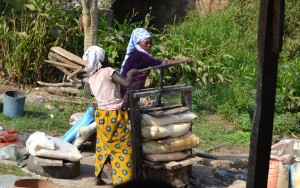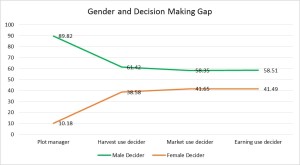Contributed by Margaret Adesugba, Senior Research Assistant, IFPRI
“When women are empowered and can claim their rights and access to land, leadership, opportunities and choices, economies grow, food security is enhanced and prospects are improved for current and future generations" - Michelle Bachelet, President of Chile and former Executive Director of the UN Entity for Gender Equality and the Empowerment of Women
Nigerian Women in Agricultural Production

Women account for over 80 per cent of the operators and operators of small-scale cassava clusters in southwest Nigeria © Margaret Adesugba 2015
Women play a crucial role in the Nigerian agricultural sector for food and nutrition security. While travelling through rice irrigation fields in Northern Nigeria with IFPRI Research Fellow Dr. Hiroyuki Takeshima, I witnessed first-hand how women work longer hours to thresh rice using manual threshing technology. When we look at cassava, we found that over eighty percent (80%) of the small-scale cassava processing clusters in the western part of Nigeria where owned and operated by women. Despite the investment of time, majority of the clusters suffered from inefficiencies emanating from limited financial resources for both maintenance and business expansion, high land rent, low processing technology, poor access to improved cassava varieties and markets. These two similar, yet unique, examples of women in agriculture and the challenges they face show that there is clear need for improvement through women empowerment in agriculture. To reach the targeted cassava and rice processing capacity and quality for Nigeria, the type of processing technology for small-scale processors especially women would have to be improved upon significantly.
Women and Decision-Making in Agricultural Production
Although women contribute tremendously to both on-farm and off-farm labour and productivity, they often act as the “silent partner” and do not partake always when it comes to decision-making on agricultural production. An ongoing study by M. Adesugba and G. Mavrotas from Nigeria Strategy Support Programme (NSSP) of the International Food Policy Research Institute (IFPRI) on the impact of gendered decision-making on agricultural productivity, using the 2012/2013 Living Standard Measurement Survey data on agriculture for Nigeria to get more insight into women empowerment through decision-making in agriculture in Nigeria, indicate that when women have access to farm inputs and markets, and they make decisions on agricultural production, either independently or together with their male counterparts, the chances of increasing productivity are very high.
While there are many factors that contribute to the under-involvement of women in decision-making in agricultural production, a major one is the perception that women are less suited to the role of decision-making. Preliminary results from the above study also indicate that there is still a huge gap in terms of decision making and access to inputs between female and their male counterparts. Gendered analysis of time allocated to work on plots shows a female to male ratio of time spent of 1.95 suggesting that female spend almost 2 times more time on farm work than their male counterparts. This implies that while women represent a small proportion of plot managers, they invest more time on farm work. Furthermore, the majority (70 per cent) of Nigerian women ranked low on the empowerment index, measured using the five domains of empowerment of the Women Empowerment in Agriculture Index (WEAI). This low level of empowerment cuts across all the geopolitical zones in Nigeria.
Maximizing Women’s Contributions to Agricultural Production
As we celebrate Women's Day today, it is essential to emphasize that empowered women can contribute tremendously to the food security of their families and overall agricultural growth in Nigeria. Agricultural investment interventions and programs in Nigeria should be well targeted to ensure women are included in terms of access to land and inputs, markets, technology, extension services and finance. Policies that will ensure equal gender-sensitive targeting of agricultural development projects such that women are incorporated right from the initial stage, along with better access to extension services and use of social networks for information sharing would significantly improve agricultural productivity. There is also a need to improve women market access beyond “just access” to active and effective participation with better inclusion in the decision making process in terms of input and labor use so that women can truly leverage on the potential they have and make valuable contributions to agricultural productivity and development in Nigeria. Policies for effective extension advice delivery mechanisms with regional and cultural considerations for inclusive gender participation would also improve the effectiveness of extension service provided.
For more information, please contact:
Margaret Adesugba, Senior Research Assistant, IFPRI Nigeria (m.adesugba@cgiar.org)
Elisabeth Douglas, Communications Specialist, IFPRI Nigeria (e.douglas@cgiar.org)




















